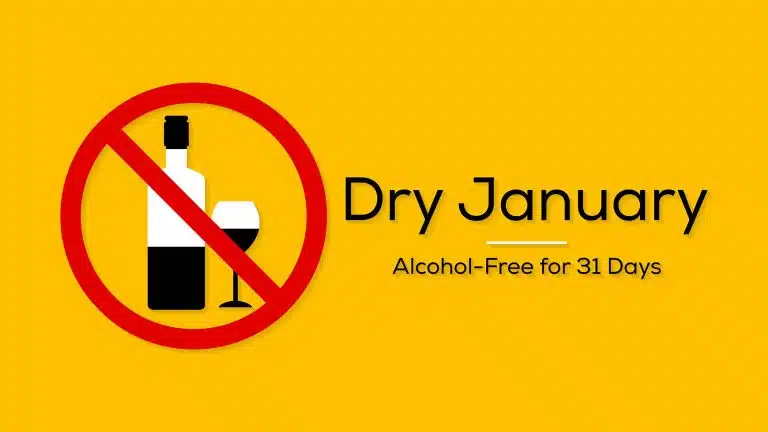How Dry January Can Jumpstart Your Alcohol Recovery

Founded in 2013 by the charity Alcohol Change UK, Dry January is an annual campaign that encourages people to abstain from alcohol for the first month of the year.
Starting the New Year alcohol-free brings a host of health benefits. It can even jumpstart your recovery from alcohol abuse.
How Dry January Helps With Alcohol Recovery
According to the National Institute on Alcohol Abuse and Alcoholism, there are two main forms of alcohol abuse: binge drinking and heavy drinking.
Binge drinking occurs when a woman has four or more drinks on one occasion and a man has five or more drinks on one occasion.
Heavy drinking occurs when a woman has three or more drinks in one day and a man has four or more drinks in one day. Both types of alcohol abuse can lead to alcohol addiction (also called alcohol use disorder).
A 2014 study by the University of Sussex found that 72% of Dry January participants had continued to avoid alcohol abuse six months into the New Year.
Indeed, the campaign offers a number of benefits that make people rethink their long-term alcohol consumption. These benefits include:
Better Mental Health
Abstaining from alcohol for an entire month helps you better understand your drinking habits. For example, you may realize that you crave a drink whenever you feel sad, stressed, or angry.
As the month progresses, you’ll have to find new, healthier ways to cope with difficult feelings, such as:
- journaling
- meditating
- expressing yourself through art
- exercising
- spending time with friends, family, or pets
In addition, when you give up alcohol, you might realize you have been using it to deal with mental health issues, such as depression or anxiety. You can then seek proper treatment for those issues.
Depending on your needs, your treatment plan may include strategies like therapy, medication, support groups, and relaxation techniques.
Better Physical Health
According to a 2018 study published in the British Medical Journal, staying sober for just one month can:
- stabilize your blood sugar levels
- lower your blood pressure
- lower your cholesterol
- lower your risk of diabetes and certain cancers
Also, many Dry January participants report better sleep, increased energy, healthier skin, and weight loss.
If you continue to avoid alcohol for the rest of the year, you’ll experience additional health benefits, including a stronger immune system and a lowered risk of liver disease and heart disease.
New Hobbies
As you abstain from alcohol, you might realize that you’ve always relied on a glass of wine to enjoy yourself. During Dry January, you’ll learn alcohol-free ways to have fun. You can revisit old hobbies or pick up new activities, such as hiking, playing sports, or visiting museums.
Financial Benefits
The average American spends hundreds of dollars per year on alcohol. People who struggle with alcohol abuse or addiction spend even more. According to the University of Sussex, 88% of Dry January participants saved money as a result of quitting alcohol.
Tips For Long-Term Recovery
Even when you understand the benefits, it can be difficult to quit drinking alcohol. Make it easier by following these tips:
Be Open
Let your friends and family know you’re participating in Dry January to benefit your health. They’ll know not to offer you alcoholic drinks, and they can also provide support if you feel like you’re about to slip up.
Ask A Friend To Participate With You
Throughout Dry January, it might seem like you’re the only person not drinking. If a friend goes sober with you, you’ll feel much less alone, especially if you invite them to any events that feature alcohol.
Manage Alcohol Triggers
An alcohol trigger is anything that makes you crave alcohol. For instance, you might be triggered by the smell of alcohol, an old drinking buddy, or an alcohol commercial.
If you can’t avoid a trigger, try breathing deeply and focusing on all the benefits of Dry January. Remember that the craving will pass.
Go Easy On Yourself
A lot of people struggle to stay sober the whole month. If you slip up and have a drink, don’t judge yourself too harshly. Instead, consider what triggered the slip-up and how you could avoid or manage that trigger in the future.
Watch For Withdrawal Symptoms
When you regularly abuse alcohol, you may become physically dependent on it. That means your body requires the drug to function normally. If you stop drinking in January, you may experience withdrawal symptoms such as:
- anxiety
- irritability
- depression
- sweating
- shaking
- headache
In many cases, you can manage these symptoms by staying hydrated, getting enough sleep, exercising, and taking time to relax.
However, if the symptoms become severe, or if you experience more serious symptoms like hallucinations or seizures, you should seek medical attention.
If you or someone you love struggles with alcohol abuse, please contact an Ark Behavioral Health specialist. Our treatment centers offer comprehensive, evidence-based services, including medical detox, mental health counseling, and medication-assisted treatment.
Written by Ark Behavioral Health Editorial Team
©2024 Ark National Holdings, LLC. | All Rights Reserved.
This page does not provide medical advice.
British Medical Journal - Short-term abstinence from alcohol and changes in cardiovascular risk factors, liver function tests and cancer-related growth factors: a prospective observational study
Centers for Disease Control and Prevention - Drinking too much alcohol can harm your health
National Institute on Alcohol Abuse and Alcoholism - Drinking Levels Defined

Questions About Treatment?
Ark Behavioral Health offers 100% confidential substance abuse assessment and treatment placement tailored to your individual needs. Achieve long-term recovery.
100% confidential. We respect your privacy.
Prefer Texting?
Our friendly support team is here to chat 24/7. Opt out any time.







 Learn More
Learn More








